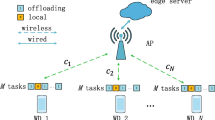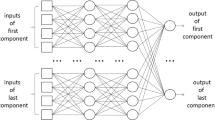Abstract
Mobile edge computation (MEC) is a potential technology to reduce the energy consumption and task execution delay for tackling computation-intensive tasks on mobile device (MD). The resource allocation of MEC is an optimization problem, however, the existing large amount of computation may hinder its practical application. In this work, we propose a multiuser MEC framework based on unsupervised deep learning to reduce energy consumption and computation by offloading tasks to edge servers. The binary offloading decision and resource allocation are jointly optimized to minimize energy consumption of MDs under latency constraint and transmit power constraint. This joint optimization problem is a mixed integer nonconvex problem which result in the gradient vanishing problem in backpropagation. To address this, we propose a novel binary computation offloading scheme (BCOS), in which a deep neural network (DNN) with an auxiliary network is designed. By using the auxiliary network as a teacher network, the student network can obtain the lossless gradient information in joint training phase. As a result, the sub-optimal solution of the optimization problem can be acquired by the learning-based BCOS. Simulation results demonstrate that the BCOS is effective to solve the binary offloading problem by the trained network with low complexity.







Similar content being viewed by others
References
Fu, X., Secci, S., Huang, D., & Jana, R. (2015). Mobile cloud computing. IEEE Communications Magazine, 53(3), 61–62.
Chen, X., Jiao, L., Li, W., & Fu, X. (2016). Efficient multi-user computation offloading for mobile-edge cloud computing. IEEE/ACM Transactions on Networking, 24(5), 2795–2808.
Xu, J., Wang, S., Bhargava, B. K., & Yang, F. (2019). A blockchain-enabled trustless crowd-intelligence ecosystem on mobile edge computing. IEEE Transactions on Industrial Informatics, 15(6), 3538–3547.
Muñoz, O., Pascual-Iserte, A., & Vidal, J. (2015). Optimization of radio and computational resources for energy efficiency in latency-constrained application offloading. IEEE Transactions on Vehicular Technology, 64(10), 4738–4755.
Sardellitti, S., Scutari, G., & Barbarossa, S. (2015). Joint optimization of radio and computational resources for multicell mobile-edge computing. IEEE Transactions on Signal and Information Processing over Networks, 1(2), 89–103.
Zhao, L., Yang, K., Tan, Z., Song, H., Al-Dubai, A., Zomaya, A., & Li, X. (2021). Vehicular computation offloading for industrial mobile edge computing. IEEE Transactions on Industrial Informatics, 14(11), 7871–7881.
Lyu, X., Tian, H., Sengul, C., & Zhang, P. (2017). Multiuser joint task offloading and resource optimization in proximate clouds. IEEE Transactions on Vehicular Technology, 66(4), 3435–3447.
Nachmani, E., Marciano, E., Lugosch, L., Gross, W. J., Burshtein, D., & Be’ery, Y. (2018). Deep learning methods for improved decoding of linear codes. IEEE Journal of Selected Topics in Signal Processing, 12(1), 119–131.
Liang, F., Shen, C., & Wu, F. (2018). An iterative BP-CNN architecture for channel decoding. IEEE Journal of Selected Topics in Signal Processing, 12(1), 144–159.
Kong, K., Song, WJ., & Min, M. (2020). Deep-learning-based precoding in multiuser MIMO downlink channels with limited feedback. arXiv preprint arXiv:2008.04147.
Liang, F., Shen, C., Yu, W., & Wu, F. (2020). Towards optimal power control via ensembling deep neural networks. IEEE Transactions on Communications, 68(3), 1760–1776.
Wei, X., Hu, C., & Dai, L. (2021). Deep learning for beamspace channel estimation in millimeter-wave massive MIMO systems. IEEE Transactions on Communications, 69(1), 182–193.
Orsini, G., Bade, D., & Lamersdorf, W. (2016). CloudAware: A context-adaptive middleware for mobile edge and cloud computing applications. In 2016 IEEE 1st International Workshops on Foundations and Applications of Self* Systems (FAS* W), pp. 216–221.
Kai, C., Zhou, H., Yi, Y., & Huang, W. (2020). Collaborative cloud-edge-end task offloading in mobile-Edge Computing Networks with Limited Communication Capability. IEEE Transactions on Cognitive communications and networking. early access. https://doi.org/10.1109/TCCN.2020.3018159
Li, M., Gao, J., Zhao, L., & Shen, X. (2020). Deep reinforcement learning for collaborative edge computing in vehicular networks. IEEE Transactions on Cognitive Communications and Networking, 6(4), 1122–1135.
Li, C., Cai, Q., Zhang, C., et al. (2021). Computation offloading and service allocation in mobile edge computing. The Journal of Supercomputing. https://doi.org/10.1007/s11227-021-03749-w.
Cui, Y., Zhang, D., Zhang, T., Chen, L., Piao, M., & Zhu, H. (2020). Novel method of mobile edge computation offloading based on evolutionary game strategy for IoT devices. AEU—International Journal of Electronics and Communications, 118, 153134.
Xu, X., Zhang, X., Gao, H., Xue, Y., Qi, L., & Dou, W. (2020). BeCome: Blockchain-enabled computation offloading for IoT in mobile edge computing. IEEE Transactions on Industrial Informatics, 16(6), 4187–4195.
Zhao, J., Li, Q., Gong, Y., & Zhang, K. (2019). Computation offloading and resource allocation for cloud assisted mobile edge computing in vehicular networks. IEEE Transactions on Vehicular Technology, 68(8), 7944–7956.
Liu, J., Mao, Y., Zhang, J., & Letaief, K. B. (2016). Delay-optimal computation task scheduling for mobile-edge computing systems. IEEE International Symposium on Information Theory (ISIT), 2016, 1451–1455.
Tran, T. X., & Pompili, D. (2019). Joint task offloading and resource allocation for multi-server mobile-edge computing networks. IEEE Transactions on Vehicular Technology, 68(1), 856–868.
Bi, S., & Zhang, Y. J. (2018). Computation rate maximization for wireless powered mobile-edge computing with binary computation offloading. IEEE Transactions on Wireless Communications, 17(6), 4177–4190.
Wang, J., Feng, D., Zhang, S., Liu, A., & Xia, X. G. (2020). Joint computation offloading and resource allocation for MEC-enabled IoT systems with imperfect CSI. IEEE Internet of Things Journal, 8(5), 3462–3475.
Zhang, C., Patras, P., & Haddadi, H. (2019). Deep learning in mobile and wireless networking: A survey. IEEE Communications Surveys & Tutorials, 21(3), 2224–2287.
Sun, H., Chen, X., Shi, Q., Hong, M., Fu, X., & Sidiropoulos, ND. (2017). Learning to optimize: Training deep neural networks for wireless resource management. In 2017 IEEE 18th International Workshop on Signal Processing Advances in Wireless Communications (SPAWC), pp. 1–6.
Gao, Z., Jiao, Q., Xiao, K., Wang, Q., Mo, Z., & Yang, Y. (2019). Deep reinforcement learning based service migration strategy for edge computing. In 2019 IEEE International Conference on Service-Oriented System Engineering (SOSE). pp. 116–1165.
Samuel, N., Diskin, T., & Wiesel A. (2017). Deep MIMO detection. pp. 1–5.
Li, J., Gao, H., Lv, T., & Lu, Y. (2018). Deep reinforcement learning based computation offloading and resource allocation for MEC. In 2018 IEEE Wireless Communications and Networking Conference (WCNC), pp. 1–6.
Ali, Z., Jiao, L., Baker, T., Abbas, G., Abbas, ZH., & Khaf, S. (2019). A deep learning approach for energy efficient computational offloading in mobile edge computing. IEEE Access, 7(149623-33).
Gong, Y., Lv, C., Cao, S., Yan, L., & Wang, H. (2020). Deep learning-based computation offloading with energy and performance optimization. EURASIP Journal on Wireless Communications and Networking, 2020(1), 69.
Wang, Y., Sheng, M., Wang, X., Wang, L., Han, W., Zhang Y, et al. (2015). Energy-optimal partial computation offloading using dynamic voltage scaling. In 2015 IEEE International Conference on Communication Workshop (ICCW), pp. 2695-2700.
Pochet, Y., & Wolsey, L. A. (2006). Production planning by mixed integer programming. Springer.
Eisen, M., Zhang, C., Chamon, L. F. O., Lee, D. D., & Ribeiro, A. (2019). Learning optimal resource allocations in wireless systems. IEEE Transactions on Signal Processing, 67(10), 2775–2790.
Eisen, M., Zhang, C., Chamon, LFO., Lee, DD., & Ribeiro, A. (2019). Dual domain learning of optimal resource allocations in wireless systems. In ICASSP 2019 - 2019 IEEE International Conference on Acoustics, Speech and Signal Processing (ICASSP), pp. 4729–4733.
Bengio, Y. (2013). Estimating or propagating gradients through stochastic neurons. Universite de Montreal arXiv:1305.2982.
Zhuang, B., Shen, C., Tan, M., Liu, L., & Reid, I. (2018). Towards effective low-bitwidth convolutional neural networks. In 2018 IEEE/CVF Conference on Computer Vision and Pattern Recognition, pp. 7920-7928.
Zhuang B, Liu J, Tan M, Liu L, Shen C. (2019). Effective training of convolutional neural networks with low-bitwidth weights and activations. arXiv preprint arXiv:1908.04680.
Zhuang, B., Liu, L., Tan, M., Shen, C., & Reid, I. (2020). Training quantized neural networks with a full-precision auxiliary module. In 2020 IEEE/CVF Conference on Computer Vision and Pattern Recognition (CVPR), pp. 1488–1497.
Acknowledgements
This work was financially supported by the Fundamental Research Funds for the Central Universities (No. CCNU20TS008).
Author information
Authors and Affiliations
Corresponding author
Ethics declarations
Conflict of interest
The authors declare that they have no known competing financial interests or personal relationships that could have appeared to influence the work reported in this paper.
Additional information
Publisher's Note
Springer Nature remains neutral with regard to jurisdictional claims in published maps and institutional affiliations.
Rights and permissions
About this article
Cite this article
Chen, X., Xu, H., Zhang, G. et al. Unsupervised Deep Learning for Binary Offloading in Mobile Edge Computation Network. Wireless Pers Commun 124, 1841–1860 (2022). https://doi.org/10.1007/s11277-021-09433-9
Accepted:
Published:
Issue Date:
DOI: https://doi.org/10.1007/s11277-021-09433-9




